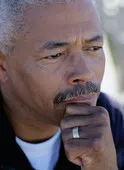Despite widespread ad campaigns, testosterone replacement isn't a panacea, but can help some men, experts say
WebMD News from HealthDay

By Serena Gordon
HealthDay Reporter
WEDNESDAY, Jan. 1, 2014 (HealthDay News) -- When men are young, testosterone tends to get a bad rap, often blamed for aggressive and overly competitive behavior. But as men get older, the bad rap continues, though for a different reason.
In older men, it's low testosterone that has captured attention.
Testosterone, the male hormone, plays a vital role in many body functions, and low testosterone levels can leave men tired, uninterested in sex, infertile and with thinning bones, according to the U.S. National Library of Medicine.
It's also a fairly common problem in older men. As many as four in 10 men older than 45 have lower than normal levels of testosterone, according to the American Urological Association.
But, replacing lost testosterone isn't a panacea, despite what you might have seen on TV.
"There's been a lot of advertising, and every guy that comes in now asks about testosterone," said Dr. Ryan Terlecki, a urologist at Wake Forest Baptist Medical Center in Winston-Salem, N.C. "They've been led to believe that it's a fountain of youth, but it's not a cure-all."
For example, many men hope that testosterone therapy will help treat erectile dysfunction. But, Terlecki said that though testosterone is a treatment for low libido and taking replacement testosterone may increase a man's sex drive, it's not a direct treatment for erectile dysfunction.
Testosterone replacement also isn't an option for men who want to preserve their fertility. That's because when a man takes testosterone therapy, the testosterone receptors in the body tell the brain that there's enough testosterone, and, in turn, the brain signals the testes to stop producing sperm.
Terlecki said it's possible that sperm production could return to normal levels after testosterone therapy is stopped. But there's no solid evidence that it will, so doctors prefer to err on the side of caution if a man believes he might still want to have children.
Men who have active prostate cancer or male breast cancer also aren't candidates for testosterone therapy.
However, other men with symptoms of low testosterone may want to consider it. For starters, that includes men who "might notice a drop in energy and low libido," Terlecki said.
Dr. Steven Canfield, chief of urology at the University of Texas Health Science Center at Houston, said that symptoms of low testosterone that men might notice also include "the development of breast tissue, a loss of body hair, small or shrinking testicles, no need for shaving, flushing, sweats and bone loss."
But, he said, there are less specific symptoms, too. Men with low testosterone might also notice "a decrease in self-confidence, feeling sad or depressed, problems with sleeping, memory problems, reduction in body mass, and a decrease in work performance," Canfield said.
source : 'Low T' Therapy: Is It for Me?








